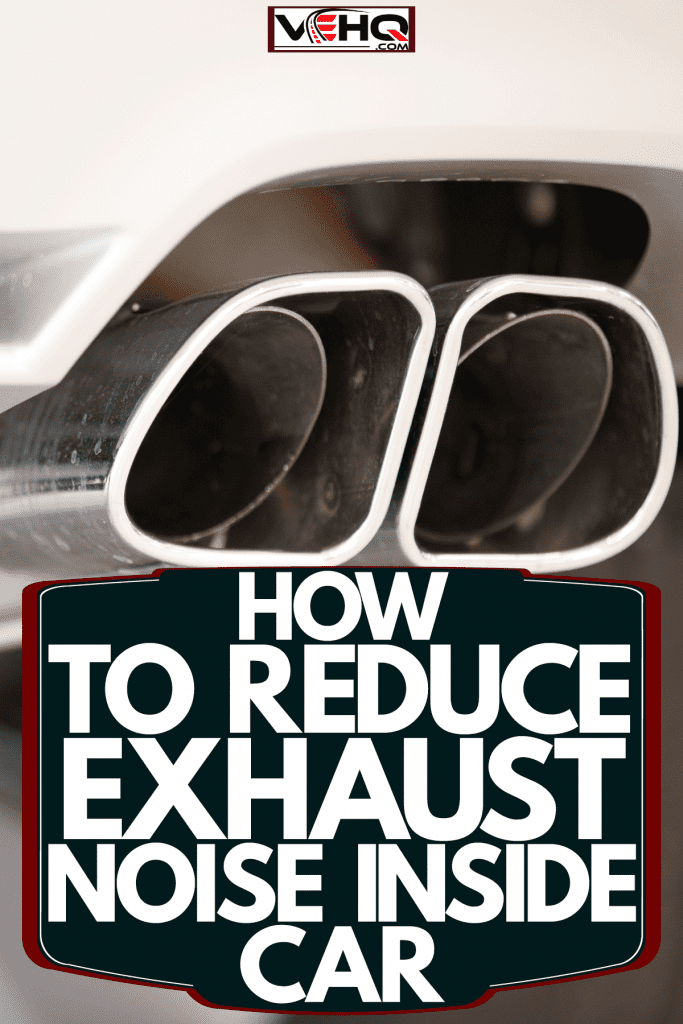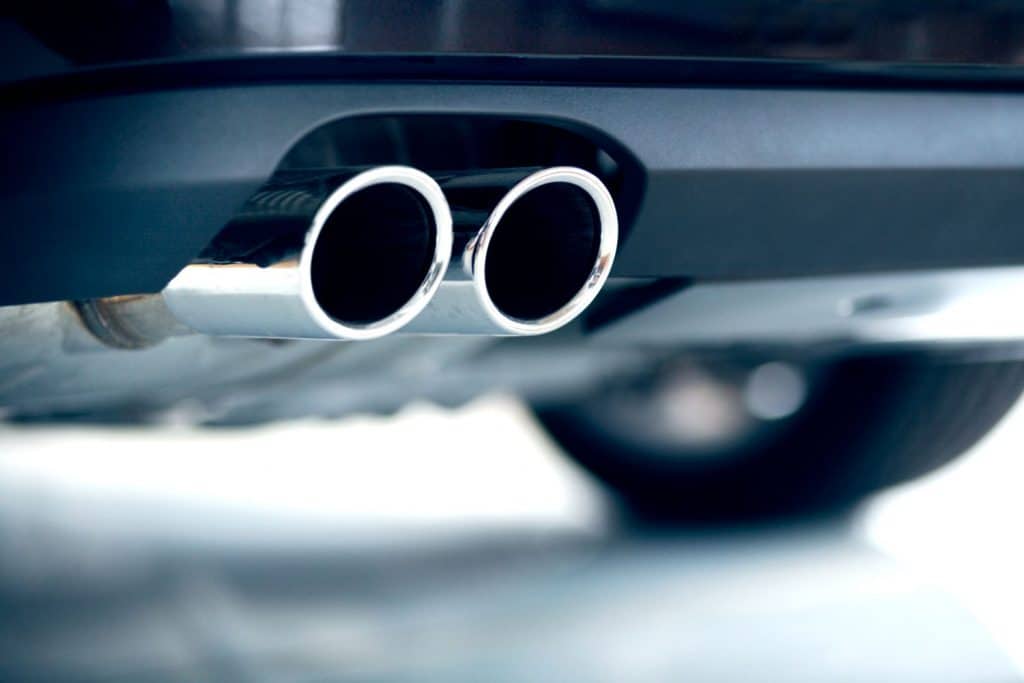It's no fun attracting attention on the road, not because your vehicle looks good but because it's making so much noise. If you discover your exhaust is incredibly noisy, you may wonder if there are ways to quiet it down. We researched helpful methods to reduce exhaust noise for a more comfortable ride. Learn more about common reasons an exhaust is excessively noisy and how to remedy this problem.
There are more than a few reasons an exhaust system might be incredibly noisy in your car. Look for the following issues so you can properly put a stop to excess noise:
- The engine is in trouble
- Problems with the catalytic converter
- The muffler has a hole or needs replacing
- There is a leak in the exhaust system
- The exhaust has holes, cracks, or rust
- The car is older or very powerful, requiring dampening materials
- The resonator is not fitted properly
Once you determine the root cause of a noisy exhaust, you can use a fitting solution. Keep reading to learn how to identify these potential causes and quiet the noise.

[toc]
Quiet A Noisy Exhaust
The exhaust system on your vehicle is composed of multiple components. The exhaust works to move different gasses, produced by your car, out and away. As the engine burns off fuel, driving releases carbon dioxide, water vapor, hydrocarbons, and other products which escape via the exhaust.

However, cracks, rust, holes, and failing mufflers or engines can create excess noise along the exhaust system. A car may need service from a mechanic, replacement parts, soundproofing, or a silencer to address a noisy exhaust.
Why Does My Car Sound So Loud Inside?
The more powerful a car, the louder the ride. Also, older cars with rusted, worn down parts or significant damage tend to be noisier.
It is helpful to add some soundproofing material to the floor, doors, and other areas of the car to reduce sound vibrations. Sometimes certain parts will need servicing or replacing to dampen sound.
A noisy car may have pinging sounds, clacking, rattling, ticking, or even a roaring sound when driving. Typically, loud, uncomfortable noises from a car are a sign of specific problems with the vehicle.
How To Quiet A Noisy Exhaust System
Some drivers love to make their cars as noisy as possible when putting the pedal to the metal on the highway. But, some states have laws that make a noisy exhaust system illegal for being a nuisance.
Depending on what's causing a noisy exhaust system, you may need a specific solution to keep things quieter. Check out the following to assess a noisy exhaust.
Hearing Pinging, Rattling, Ticking, or Roaring
Hearing a ticking sound could be caused by a leak in the exhaust, but rattling is often a sign something is loose. A rusted muffler, failing catalytic converter, or a tailpipe with lots of corrosion can also cause rattling.
Pinging is usually coming from the engine and sounds like loose screws bouncing around. Hearing pinging may be a sign of a low-grade fuel, built-up carbon in the combustion chamber, or something needs repair.
When a car begins to sound like it's roaring, check out the manifold for leaks or cracks. You may need to replace the muffler and add a silencer.
A noisy exhaust system will send out more vibrations throughout the car when parts fail to absorb and dampen the sound. Also, supped-up vehicles with a lot of horsepower tend to sound louder and more aggressive.
Muffler Problems
Some drivers love to make their cars sound louder when on the road, but it is illegal to produce noise pollution with your vehicle in some places. If your car is emitting unwanted noise, the muffler may have cracks, holes, or leaks that need repairing or require replacing the part.
Add A Silencer
Quickly put a stop to a noisy exhaust with the addition of a tip silencer. If your exhaust system is too short to handle a silencer, you may have to make some adjustments.
You can make a DIY silencer with a soda can or sound-absorbing materials at your own risk or purchase a commercial part. Silencers may be a diffuser-style, insert, one-piece, or packable to reduce noise.
Check out this silencer for a muffler on Amazon.
Leaks, Holes, or Rust
Leaks, holes, or rust throughout the exhaust system can create a host of problems. However, replacing a part or patching a hole usually solves issues. If you hear hissing or tapping, it may be a sign of problems with the exhaust manifold gasket. Broken or cracked exhaust tubes or pipes can cause an engine to sound louder.
Engine or Catalytic Converter Problems
A damaged or failing catalytic converter often causes a rattling sound that grows louder over time. If the catalytic converter is missing or removed from a car, it is not available to reduce noise from the exhaust system.
You may hear a louder, low-pitched sound from the exhaust without the catalytic converter. If an engine is failing or is clogged, the exhaust may sound louder over time. Check for loose connections, broken or cracked parts, or leaks.
Read more: "Clogged Catalytic Converter – How To Tell And What To Do?"
Ill-fitting Resonator
Sometimes you need to ensure that parts are fitting correctly and tightly pieced together. When you have loose parts, the exhaust can become noisy, and you may hear rattling or clicking sounds.
Also, be aware of damage to car parts while on the road. Dings, dents, and broken places within the exhaust system under the body can create more noise.
Check out this resonator on Amazon.
Add Soundproofing
Your car could always use a little more soundproofing to reduce noisy exhaust and sounds on the roadways. Adding soundproofing material to the flooring and body of a car helps increase privacy inside the car and makes a more comfortable ride.
Depending on the size of your vehicle and how much area you want to add insulating material to will determine the price. Prepare to spend a few hundred dollars to dampen sounds coming from your car or outside while driving around.
Check out this sound deadening material on Amazon.
How Much Does Soundproofing A Car Cost?
If you choose to hire a professional to install soundproofing material in your car, it is more expensive than doing it yourself. However, it is well worth investing in adding sound deadening material to insulate a vehicle.
Prepare to spend around $600 to $800 to insulate most of your car, with an average cost of $60 an hour for service. A small amount of insulation costs $8 to $20. An average kit costs $60 to $130 and can insulate two doors and the floor of an average-sized vehicle according to The Drive.
Is Soundproofing Your Car Worth It?
When you are driving, you want to be able to focus on the road and enjoy the drive. Soundproofing your vehicle is worth the investment for multiple reasons. Increase the quality of your sound system, increase privacy, muzzle a noisy exhaust, and other exterior sounds using sound-deadening materials.
A car that has been soundproofed will be more pleasant to drive and ride around in, and soundproofing is fairly inexpensive. Prepare to spend a minimum of $100 to $500 on adding sound-deadening features to a car's floor, doors, and other areas.
What Is The Quietest Car To Drive?
According to Car and Driver, here are some of the quietest vehicles to hit the road. Check out the following cars for their low level of vibration, harshness, and overall noise.
- Audi A6
- Audi A8
- Kia Optima
- Kia K900
- Lexus GS
- Mercedes-Benz S550e
- Tesla Model S
A quieter car can reduce the stress of commuting and attract less undesirable attention when driving.
In Closing
We hope you discovered some helpful ways to quiet a noisy exhaust and understand what's causing excessive noise from your vehicle. In most instances, you can quiet your exhaust with a few handy products without having to hire a professional mechanic.
However, if you do not feel comfortable working on your vehicle, trust a certified, experienced professional to do the job. Also, consider adding sound-deadening materials to your car. You can reduce noises from your car and on the road using floor mats and insulation within the doors for a few hundred dollars.
Before you go, you won't want to miss the following helpful articles:



